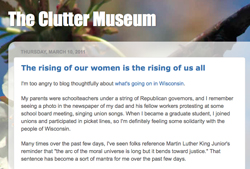In my post earlier this week, I wrote,
Recently, my university revised its general ed requirements, and in order for a course to count toward those requirements, we had to send department faculty to a course design institute to ensure the courses met university-wide learning outcomes. I was actually fine with that, as we were allowed to be pretty damn vague about what would go on in each section of a course–e.g., “assessments may include, but are not limited to, essays, exams, and group presentations.”
I find mandatory administration-imposed course design institutes absolutely terrifying. You’re the expert on how to design a successful history course, not some “learning scientist” or, even worse, a Deanlet. Professors are trained professionals. We should be allowed to do our jobs however we see fit. Allowing vagueness is just the first salvo in a campaign that will end with complete deprofessionalization if all of us aren’t careful.
I have mixed feelings about mandatory professional development exercises around teaching.
On the one hand, I certainly don’t like being told I have to go to them. Like most faculty, I chafe at the idea of any kind of mandatory “training,” especially since so much training at universities leaves something to be desired.
On the other hand, having worked in a teaching center, I definitely see the utility to some faculty of course design tutorials. While those of us in the humanities usually have had plenty of hands-on experience in teaching and even course development by the time we hit the post-Ph.D. adjunct or tenure-track (I designed and taught my first course in 1999, and started on the tenure track in 2010, for example), faculty in the sciences often have had no experience in the classroom. Junior science faculty often arrive on campus after years of lab- or fieldwork, and they were hired—at least at universities with particular kinds of aspirations—because of their research experience. At UC Davis, I regularly had tenure-line science faculty approach me in their third quarter (after two quarters of course releases), asking me how to teach all kinds of courses or manage TAs. Our semester-long Seminar in College Teaching was always packed with science grad students and postdocs.
However, we weren’t reaching all the science faculty with our various offerings, and I know there were many who would have benefited from even the briefest orientation to college teaching.
So do I think teaching workshops should be required for some faculty? Yes. (In an ideal world, departments would be the ones insisting on such training and ensuring people are teaching well.) I think faculty who haven’t acquired teaching experience during grad school, when they have access to mentors or supervisors, need to be introduced to basic concepts in teaching, such as the relationship of course objectives to activities to assessment. Should the university be deciding for faculty what those objectives, activities, and assessments should be? No. But from talking to new science faculty and interviewing their undergraduate students (at the faculty’s request), I learned there needs to be some kind of professional development for teaching. I’m sure there are some social scientists, artists, and humanists who have also managed to dodge teaching prior to being hired to a full-time job.
I’ve noticed that at many campuses, there’s a good deal of ill will toward the “center for excellence in teaching and learning” or whatever the fashionable name for such centers is these days. I think a lot of that ill will comes from the teaching centers colluding with administrators on professional development opportunities that are mandatory for all faculty regardless of the individual instructors’ experiences. At UC Davis, we tried to steer clear of such mandates, and we tried our damnedest to make ourselves useful to the local faculty rather than just preach best practices based on what we read in some journal.


“Professors are trained professionals. We should be allowed to do our jobs however we see fit.”
As Leslie notes, at least at research universities, many professors are trained SCHOLARS and RESEARCHERS, but not necessarily trained TEACHERS. That we hire people who cannot do a significant piece of their job well — basically because they are so good at the other major piece — is a serious problem, but one that can’t be affected without changing the culture of the research university. Maybe, though, if we reach the faculty currently here (since they are the ones who will select the new hires) we will start changing the culture…
I also am sad to say that Leslie’s observation about humanities folks having more pedagogy training, while generally true, does not always apply. Some folks won’t do professional development if it’s not required of them, even in supposedly teaching-focused areas.
There are other ways to require it, and I tend to agree that it should be handled at a departmental level. Perhaps attending a training event like Leslie describes could be *one* way that faculty can meet a departmental requirement for what is basically continuing professional education.
HA! A comment was not enough for this one, so I went ahead and wrote my own blog post. 😉 I’d love to hear what you have to say and I could share some more too about how most excellent this institute was (at least for me)! (and I can tell you more about who is who — like which universities I’m talking about) over email
😉
what Sarah said is EXCELLENT!!
As a history prof-turned-teaching center person I’m grateful for the balance you strike here, Leslie. I’m a great admirer of Jonathan and worry that ultimately he’s right about me and my bullshit job…That said, in our center we strenuously avoid any mandatory programming (new TAs are really the only folks subjected to that and the reactions are predictable), though occasionally our “clients” in various schools demand it, over our recommendations. Although it is difficult to generalize – at my research university, there is no shortage of not only individual faculty who are terrific and exceptionally thoughtful teachers but also departments with vigorous cultures of mentoring and collegial conversations regarding teaching – I think we can be useful as catalysts for creating opportunities for faculty to share experiences and ideas. That said, my colleagues and I are very much aware of what one award-winning teacher who was denied tenure told us: “I like you guys, but you know you only exist to provide ideological cover to the university.”
The fact that some faculty have teaching experience doesn’t mean that they have ever had training, mentorship or support nor that they have reflected on how they teach or how they might teach differently.
There are debates to be had about what that professional development should look like but one of the idea that once you have finished the PhD and secured a tenure-track job you no longer need any professional development is ludicrous. There are new developments all the time. You take on new responsibilities. The context in which you are doing your job changes. And your employer should provide the professional development opportunities you need to adapt to those changes.
Indeed some of those changes may come from your own desire to improve or take your teaching or research in a new direction. That might include learning new research techniques. Learning to use new technologies in teaching. Or just getting a refresher on some of the principles and a structured opportunity to reflect on your practice and make some decisions about how you will go forward.
The fact that some professional development opportunities do not meet your needs or that they seem to serve an administrative purpose is not an argument for not having professional development. It’s an argument for demanding more appropriate professional development.
I know you’ve written another (very interesting) post and that maybe this conversation is over, but I should have provided the link to my “2 cents” in my comment above, but here it goes:
http://mamaintranslation.blogspot.com/2013/10/on-course-design-and-learner-based.html
OK, lazy me, live link here.